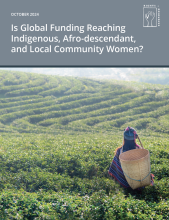Land Library
Welcome to the Land Portal Library. Explore our vast collection of open-access resources (over 74,000) including reports, journal articles, research papers, peer-reviewed publications, legal documents, videos and much more.
/ library resources
Showing items 1 through 9 of 3724.Climatewash: The World Bank’s Fresh Offensive on Land Rights reveals how the Bank is appropriating climate commitments made at the Conference of the Parties (COP) to justify its multibillion-dollar initiative to “formalize” land tenure across the Global South.
The study on collective tenure rights and climate action in sub-Saharan Africa aims to consolidate and analyse the state of the evidence on how tenure arrangements – in particular collective ownership and management of forests operating in complex systems of contingent factors – impact forest con
Land tenure security is a concept that informs land governance interventions. In short, the thinking is that tenure security will lead to positive economic, environmental and social impacts and hence to improved livelihoods for the land right holders.
The Mekong Region has experienced rapid agrarian change over the past two decades, driven by public sector policies promoting agricultural commercialisation to alleviate rural poverty, provide income opportunities, and modernize agricultural production systems.
Le Projet Global sur la Promotion d’une Politique Foncière Responsable (ProPFR) avec sa composante à Madagascar vise une amélioration de l’accès à la terre des populations rurales des régions Boeny et DIANA au travers l’adhésion volontaire à la procédure légale de sécurisation des droits individu
In response to the dearth of data on funding for women and the need to support international advocacy promoting direct funding to IP, ADP, and LC women’s groups and organizations, the Rights and Resources Initiative (RRI) initiated a bottom-up research effort to build a baseline for measuring fun
On the 28 of June 2024, the Forum of African Traditional Authorities (FATA) was officially launched in Addis Ababa, Ethiopia.
Les fiches « Analyse des cadres juridiques et institutionnels » du CTFD fournissent par pays, un état des lieux des dispositifs organisant le foncier et l’accès aux ressources naturelles (renouvelables ou non), et en étudient les liens avec les processus de décentralisation à l’œuvre dans les dif









